

A Drone, Too Small for Radar to Detect, Rattles the White House - NYTimes.com. Photo WASHINGTON — A White House radar system designed to detect flying objects like planes, missiles and large drones failed to pick up a small drone that crashed into a tree on the South Lawn early Monday morning, according to law enforcement officials.
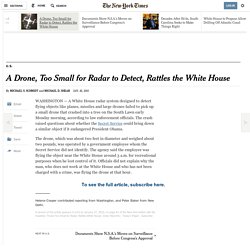
The crash raised questions about whether the could bring down a similar object if it endangered President Obama. The Super Bowl doesn't need terrorism insurance. Here's why. In its final week, the 113th US Congress managed to pass a spending bill loaded with policy giveaways to special interests, and a year-long extension of mostly corporate tax breaks.
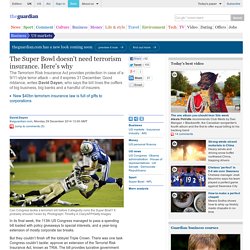
But they couldn’t finish off the lobbyist Triple Crown. There was one task Congress couldn’t tackle: approve an extension of the Terrorist Risk Insurance Act, known as TRIA. The bill provides lucrative government bailout protection for the insurance industry in case of a terrorist attack like 9/11 or, as Hollywood has feared, retribution for American entertainment choices by North Korea.
Top Ten: Climate and Security in 2014 « The Center for Climate. The year 2014 is at an end.
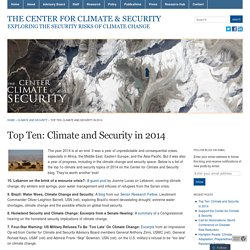
It was a year of unpredictable and consequential crises, especially in Africa, the Middle East, Eastern Europe, and the Asia-Pacific. But it was also a year of progress, including in the climate change and security space. Below is a list of the top 1o climate and security topics of 2014 on the Center for Climate and Security blog. They’re worth another look! 10. 9. Climate change boosting risks of conflict in fragile states - report. Briefing for UK aid workers says climate-related factors are making the world increasingly unstable African Union soldiers, as part of the Ugandan contingent of AMISOM, conduct a foot patrol on April 29 through the town of Qoryooley, Somalia (AU UN IST PHOTO / Tobin Jones) By Paul Brown A chilling account of how climate change is already adding to the problems of conflict and social breakdown in fragile states is contained in an advice document to the staff of the UK’s Department for International Development (DFID).
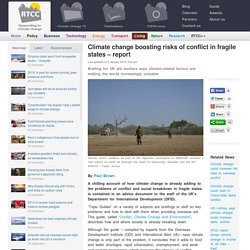
“Topic Guides” on a variety of subjects are briefings to staff on key problems and how to deal with them when providing overseas aid. Human Security in the Age of Ebola: Towards People-centered Global Governance. The Ebola outbreak that began in March 2014 continues to ravage the West African countries of Guinea, Liberia and Sierra Leone and has claimed over 4,500 lives thus far.
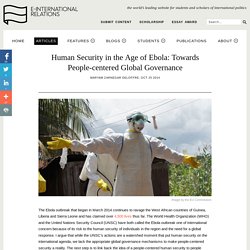
The World Health Organization (WHO) and the United Nations Security Council (UNSC) have both called the Ebola outbreak one of international concern because of its risk to the human security of individuals in the region and the need for a global response. I argue that while the UNSC’s actions are a watershed moment that put human security on the international agenda, we lack the appropriate global governance mechanisms to make people-centered security a reality. The next step is to link back the idea of a people-centered human security to people through appropriate global governance mechanisms that enhance accountability to beneficiaries of humanitarian aid.
Human Security. Global Systemic Risk - Global Systemic Risk - PIIRS. There is no better indicator of increasing globalization than the massive and accelerating increase in international transactions beginning in the late 1970s.
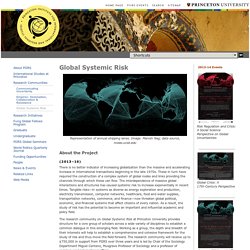
These in turn have required the construction of a complex system of global nodes and links providing the channels through which these can flow. The interdependence of massive global interactions and structures has caused systemic risk to increase exponentially in recent times. A RISKY PROPOSITION: Has global interdependence made us vulnerable?
RISK IS EVERYWHERE.
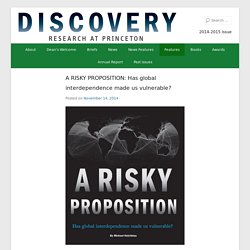
There’s a risk, for example, that volcanic ash will damage aircraft engines. So when a volcano erupted in Iceland in April 2010, concerns about the plume of volcanic ash disrupted air travel across Europe for about a week. Consumer Insights as the Answer to VUCA (Volatility, Uncertainty, Complexity, and Ambiguity) At the Marketing Research Association’s Insights & Strategy Conference last week in Chicago, Christie Hickman of the Outdoor Industry Association shared the need for researchers to take a flexible, iterative approach to understanding a disruptive business world.
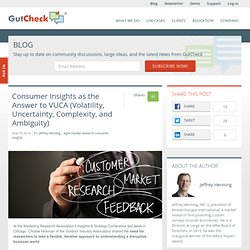
VUCA: What Does This Mean for Future Leaders. Development Dimensions International (DDI), jointly with The Conference Board, conducted a survey of 13,124 leaders across many organizations, industries, and countries.
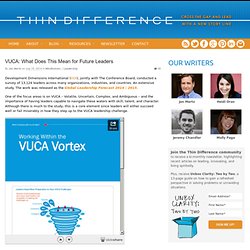
An extensive study. The work was released as the Global Leadership Forecast 2014 | 2015. One of the focus areas is on VUCA – Volatile, Uncertain, Complex, and Ambiguous – and the importance of having leaders capable to navigate these waters with skill, talent, and character. Although there is much to the study, this is a core element since leaders will either succeed well or fail miserably in how they step up to the VUCA leadership challenge. How to Manage Volatility, Uncertainty, Complexity and Ambiguity. How to Manage Volatility, Uncertainty, Complexity and Ambiguity – Part 1 When dealing with increased VUCA – volatility, uncertainty, complexity and ambiguity – what can leaders do?
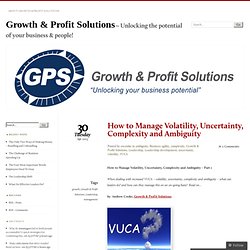
And how can they manage this on an on-going basis? Read on… by Andrew Cooke, Growth & Profit Solutions. It's Time for Business to Earn a License to Lead The acronym VUCA -- Volatile, Uncertain, Complex, Ambiguous -- may have its origins in the military, but it is increasingly clear that it applies to all aspects of our lives today. The fact is we operate in an age of fast-moving and increasingly unpredictable change. No one country, society, industrial sector or individual organisation is immune.
We are all impacted. Navigating this new reality is made even more challenging by the increasingly interdependent nature of today's world. The issues and predicaments we face are linked inextricably as never before. Permissible growth in the future has to be based on sustainable and equitable models. This is the essence behind the Unilever Sustainable Living Plan, which gives expression to the company's commitment to double its size while reducing its overall environmental footprint and increasing its positive social impact. If we get this right we can make a difference. Systemic risk.
In finance, systemic risk is the risk of collapse of an entire financial system or entire market, as opposed to risk associated with any one individual entity, group or component of a system, that can be contained therein without harming the entire system.[1][2][3] It can be defined as "financial system instability, potentially catastrophic, caused or exacerbated by idiosyncratic events or conditions in financial intermediaries".[4] It refers to the risks imposed by interlinkages and interdependencies in a system or market, where the failure of a single entity or cluster of entities can cause a cascading failure, which could potentially bankrupt or bring down the entire system or market.[5] It is also sometimes erroneously referred to as "systematic risk".
Explanation[edit] Systemic risk has been associated with a bank run which has a cascading effect on other banks which are owed money by the first bank in trouble, causing a cascading failure. Measurement of systemic risk[edit] Correlation does not imply causation. The counter assumption, that correlation proves causation, is considered a questionable cause logical fallacy in that two events occurring together are taken to have a cause-and-effect relationship. This fallacy is also known as cum hoc ergo propter hoc, Latin for "with this, therefore because of this", and "false cause". A similar fallacy, that an event that follows another was necessarily a consequence of the first event, is sometimes described as post hoc ergo propter hoc (Latin for "after this, therefore because of this").
As with any logical fallacy, identifying that the reasoning behind an argument is flawed does not imply that the resulting conclusion is false. The Dilemmas of Leading in a VUCA World. Suppose you're a state legislator. You're about to vote on a bill that would impose significant regulations on hydraulic fracturing, the controversial process for extracting natural gas from shale rock whose use has skyrocketed in the past decade. Depending on your perspective, "fracking" is providing us with a clean, inexpensive energy source or it is a major health threat that poisons the air and water around drilling sites. Proponents point to lower energy costs and lower greenhouse-gas emissions. Opponents cite more than 160 cases of drinking-water contamination near fracking sites. Do you view fracking as a blessing that reduces our reliance on polluting fuels while it produces jobs? VUCA Lessons For Agile.
Bob Johansen author of “Get There Early: Sensing the Future to Compete in the Present” outlines the challenges of VUCA projects. VUCA is a military term used to describe environments characterized by: VolatilityUncertaintyComplexityAmbiguity In such environments standard Command-and-Control processes are not effective. I recently attended a great presentation by Denise Caron who outlined Bob’s description of VUCA challenges and the new leadership models that lend themselves to these circumstances.
Volatility, Uncertainty, Complexity and Ambiguity (VUCA) Paradigm for Leadership. 6 Things You Should Know About The Future. It's A Vuca World! A Framework for Understanding VUCA - Scott Berinato. Manifesto. Crisis as catalyst. Risk as renewal. Classical strategic planning is based upon the assumption of a slowly changing future. That assumption is wrong. Climate change, technological innovation, resource shortages, political and social volatility, and more frequent technical and natural disasters point to a newly emerging context for strategic planning.
Volatility, Uncertainty, Complexity and Ambiguity. Get There Early by Bob Johansen (BK Business Book)
SuperVUCA World. Volatility. Complexity. Ambiguity. Volatility, uncertainty, complexity and ambiguity.